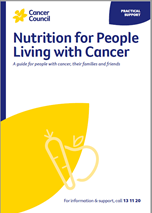Diabetes
Insulin is a hormone that controls the amount of sugar in the blood. A person with diabetes does not create or produce enough insulin or has a resistance to the effects of insulin. This means they need medicines to help control their blood sugar levels.
Learn more about:
- Side effects and diabetes
- Steroids and diabetes
- Pancreatic cancer and diabetes
- Enzyme replacement therapy
Side effects and diabetes
Some treatment side effects may make controlling blood sugar levels difficult. These include loss of appetite, nausea, fatigue, constipation and diarrhoea. If you are unable to eat enough, your blood sugar levels may drop too low.
You may need to check your blood sugar levels more often and have snacks that include a variety of carbohydrates. Choose carbohydrate foods that produce a slower rise in blood glucose levels – these are described as having a low glycaemic index (GI). You can also talk to your doctor about changing your dose of insulin or tablets.
Steroids and diabetes
Some medicines, such as steroids, can also cause high or unstable blood sugar levels in people with diabetes. How long the steroids affect your blood sugar levels will depend on the dose and type of steroid you are taking. Steroids given as creams or nasal sprays are unlikely to affect blood sugar levels.
Blood sugar levels should go back to a healthy range once you have finished your course of steroids. Talk to your doctor about how to monitor your blood sugar levels if you have diabetes and are prescribed steroids. Strategies may include taking medicines, eating well and moving more.
Pancreatic cancer and diabetes
Some people with pancreatic cancer develop diabetes before the cancer is diagnosed or after surgery to remove the pancreas. The way diabetes is managed varies from person to person, but it usually includes making changes to your diet and taking medicines including insulin.
Enzyme replacement therapy
The pancreas produces digestive enzymes to help break down food. If you have had surgery for pancreatic cancer, your body may not be able to make enough of these enzymes. This will affect your ability to digest food and is often referred to as pancreatic exocrine insufficiency.
Signs include diarrhoea, pain in the abdomen, bloating and pale, floating faeces. To help prevent these symptoms, ask your doctor or a dietitian for information on enzyme supplements.
For more on this, see Pancreatic cancer.
→ READ MORE: Eating with a stoma
Podcast: Managing Cancer Fatigue
Listen to more of our podcast for people affected by cancer
More resources
Jacqueline Baker, Senior Oncology Dietitian, Chris O’Brien Lifehouse, NSW; Lauren Atkins, Advanced Accredited Practising Dietitian, OnCore Nutrition, VIC; Dr Tsien Fua, Head and Neck Radiation Oncology Specialist, Peter MacCallum Cancer Centre, VIC; Rosemerry Hodgkin, 13 11 20 Consultant, Cancer Council WA; Clare Hughes, Manager, Nutrition Unit, Cancer Council NSW; John Spurr, Consumer; Emma Vale, Senior Dietitian, GenesisCare, SA; David Wood, Consumer.
View the Cancer Council NSW editorial policy.
View all publications or call 13 11 20 for free printed copies.

